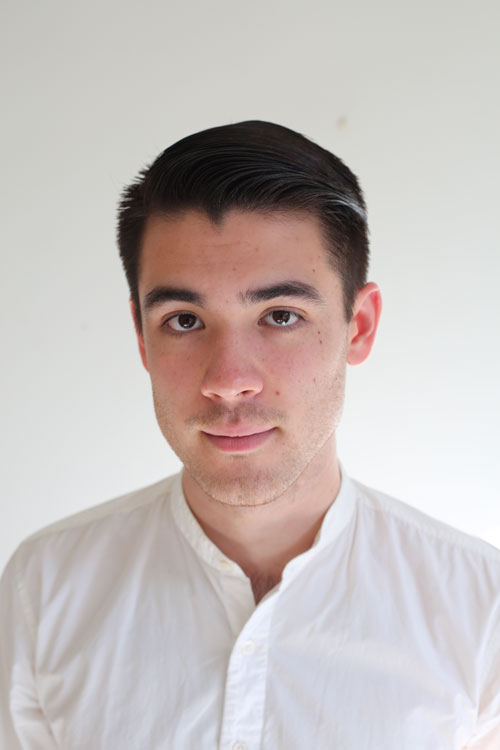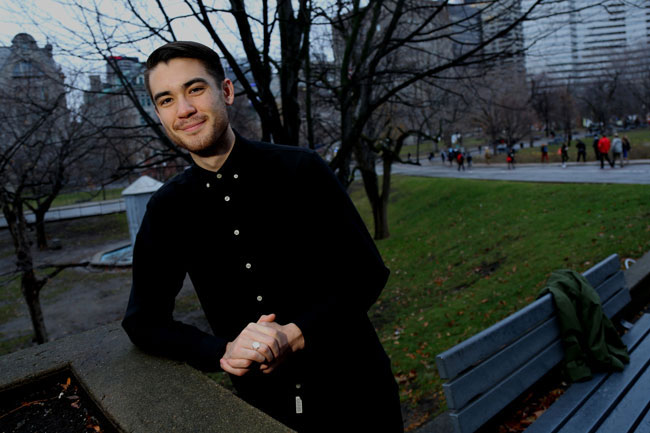
By Doug Sweet
A few years ago, he was flunking out of high school in Vancouver’s gritty east end, near neighbourhoods known more in lurid headlines for needles, prostitution and violent crime than for top-drawer scholars.
And he almost didn’t make it.
Today, Kazumi Fraser Hoshino-Macdonald is looking forward to entering Oxford University next September as McGill’s 139th Rhodes Scholar, preparing to pursue a Master’s degree in Development Studies, as he continues to train his agile mind on how city-states like Singapore have blasted their way to prominence despite a lack of natural resources – looking at the linkages between international relations and international development, with a view to advancing interdisciplinary thinking in development policy.
Hoshino-Macdonald, 23, majoring in International Development Studies, is about to blast off himself – wrapping up his undergrad work at McGill this semester before heading to Hong Kong in January for an exchange program at Hong Kong University that will keep him in one of the city states he wants to study until May.
Like other Rhodes Scholars before him, he possesses the usual tool kit: articulate, whip smart, curious, active in extra-curricular life and unfailingly polite.
“I’m kind of still digesting it,” he said. “It hasn’t quite settled in yet.”
Hoshino-Macdonald’s intriguing name is a clue to an unusual upbringing that shaped his academic interests, as well as his non-academic pursuits that have, together, positioned him to be in the vanguard of a new breed of Rhodes Scholar, as the venerable program moves even farther away from only reflecting its old white, privileged, Anglo-Saxon underpinnings.
This year, Canada saw its first indigenous Rhodes Scholar named, when the University of Alberta’s Billy-Ray Belcourt received the coveted scholarship that pays for graduate study at Oxford. Another of the U of A’s unprecedented trio of Rhodes winners this year, Zia Saleh, who was raised by a single mother in Edmonton’s Ismaili Muslim community, attended McGill as a W. Garfield Weston Loran Scholar, but returned to Edmonton in order to enter medical school at U of A.

Hoshino-Macdonald was born to a Japanese mother and sixth-generation, Ontario-born Canadian with obvious Scottish heritage in his past. His parents separated at a young age and Hoshino-Macdonald grew up in both their houses, both their cultures. From his mother’s side, he learned to have a different relationship with his grandparents, learned some Japanese and was steeped in that culture, even visiting relatives in Japan. On his father’s side, he learned that while he was not related to Sir John A. Macdonald, there was a political Macdonald in his lineage (a Senator from Ontario, he said), as well as a more traditional Canadian culture.
“These were very different cultural norms that I grew up with,” he said.
He also learned about one of the darker chapters in Canadian history, how the internment of Japanese Canadians during the Second World War contributed to the economic deprivation still rampant today in Vancouver’s Downtown East Side.
“I saw Kitsilano,” Hoshino-Macdonald said of one of Vancouver’s middle- to upper-middle-class residential enclaves, “and I saw the Downtown East Side. And I thought, ‘how could these two conditions exist in the same city?
“So my own idea about being a Canadian was very centred in geo-politics from the start.”
The road to success wasn’t always obvious. In fact, it was pretty obscure.
“In high school I was a terrible student,” Hoshino-Macdonald said. “I was interested in stuff they weren’t teaching. And it was a tough high school. Being interested in what was going on in the classroom wasn’t considered cool.”
He suffered through numerous teachers’ strikes, peer pressure to not be an active student and ended up feeling uncertain of his future.
“I felt stupid and incompetent,” he said.
And then he found a different kind of learning. He volunteered at the Environmental Youth Alliance, an NGO in Vancouver’s Gastown district that describes itself as “a non-profit charity that cultivates transformative nature experiences for children and youth in urban environments to foster community connectedness, build ecological leadership skills, and enhance their well-being.” Fancy language for getting kids grounded and interested.
From there, Hoshino-Macdonald became involved in other youth activist organizations and with at-risk youth. He learned a lot, he said, more than he had learned to date in high school.
But along with that came the realization that “the only way, if I’m ever going to do something, is to get the academic tool kit.”
So he enrolled in Langara College, in South Vancouver, which he described a kind of a last-chance school for those who had or were in danger of dropping out of school.
“I worked my ass off for two years,” he said, and got back on track. Along the way, he visited friends in Montreal, who encouraged him to apply to McGill. Doubtful, he nonetheless applied and found himself on a waiting list to get in. Soon, after, he was offered admission.
“I just never thought I would end up in a place like this,” Hoshino-Macdonald said. “In my time at McGill, I’ve met so many smart people, so many incredible people” who also encouraged him to take another big step and apply for a Rhodes scholarship.
“ ‘You’ve got a weird story,’ they told me, ‘and you should go for it.’ I just kept being encouraged by my peer group to reach for the stars.”
He did. And now it’s on to Oxford with one of the world’s most prestigious scholarships in his pocket.
During his time at McGill, Hoshino-Macdonald has worked as a research assistant under professors in Islamic studies, at the Institute for the Study of International Development, and in Sociology under John Anthony Hall.
He has also kept in shape through cycling and running, participated in extra-curricular events, such as serving on the McGill International Review board and finding out along the way that it’s not a bad thing at all to aim high.
Editor’s Note: There has been some confusion concerning another of this year’s Rhodes Scholars, Zia Saleh, and whether or not he should be considered a McGill Rhodes Scholar. Although Saleh did attend McGill for three years as a W. Garfield Weston Loran Scholar, he returned to Edmonton in order to enter medical school at University of Alberta before he could finish his McGill degree. “I do attribute much of my trajectory toward the Rhodes to my time at McGill,” says Saleh. “I am thankful to both McGill and the University of Alberta for helping make the award a reality.” Saleh founded and grew a sports program for underserved youth in both cities, and he co-led a cultural exchange program for students in Edmonton and Uganda. Through the Loran Scholars Foundation’s summer program, Saleh worked for the World Health Organization and Deloitte Canada. He plans to pursue an MSc in Global Health Science and a Master of Public Policy degree.
Related stories
Two more for the Rhodes from McGill
Meet Suzy Newing, McGill’s newest Rhodes Scholar
Runner McCuaig to hit the Rhodes
Rhodes warrior: Kickboxer Thain makes the grade – perfectly

Why is it only about the 139th Rhodes Scholar?
WHAT ABOUT McGILL’S 140TH RHODES SCHOLAR – ZIA SALEH???
McGill does not feature or write anything about Zia Saleh (its 140th Rhodes Scholar) simply because he is Muslim. Racist McGill!
I am sure the moderator will not allow this to be posted and will censor free expression. I will copy the principal for this comment that the McGill Reporter itself is soliciting from its readers.
This has been addressed in the Editor’s Note at the end of the article. As much as McGill would love to claim Zia as its 140th Rhodes Scholar, it just wouldn’t be true.